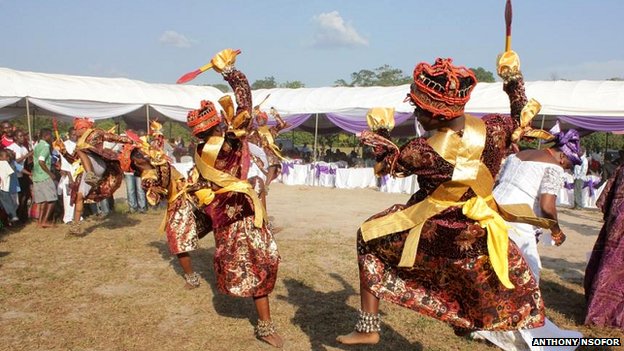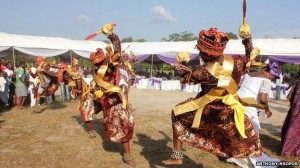By Adaobi Tricia Nwaubani
Dignitaries from across the world are gathering in Ogidi, in Nigeria’s Anambra state, to witness the interment of renowned author Chinua Achebe on Thursday. Yet after they have paid their last respects, said their final farewells and departed, a vital aspect of Mr Achebe’s burial will still be pending.
According to Igbo tradition, death is not an end to life. It is simply a transition to a new world. And without the rites of passage performed during a ceremony called “ikwa ozu”, which means “celebrating the dead”, Mr Achebe will be forbidden from taking his rightful place among his ancestors. No matter how accomplished he was in this life, the literary icon would not be accorded an iota of respect in the next world.
“Ikwa ozu” rites differ from community to community. The one commonality is that they occur after the elderly deceased is buried. Mr Achebe’s “ikwa ozu” is scheduled for immediately following his interment, on 24 and 25 May.
Igbo funerals are typically lavish. It is not uncommon to hear people express anxiety when a relative is ill: “God, please, don’t let my mother die. I can’t afford her burial right now.” Vast amounts are expended on livestock and alcohol entitlements for the various age grades within the deceased’s community, for the entertainment of guests and, usually, for the long-distance transportation of the corpse.
The honourable final resting place for an Igbo man is his ancestral village; and for a woman, in her husband’s village. In order to recuperate financially, many families tend to wait several months after the burial before embarking on the even more expensive “ikwa ozu”, a situation that has led to the ceremony being frequently referred to as the “second burial”.
Mock Trial
Sometimes, families that can afford to organise the ceremony immediately also prefer to wait for months. That way, they and their friends can reconvene for a second fanfare, and maybe combine the “ikwa ozu” with a grand memorial service. Depending on what traditional titles the deceased held in his lifetime, the “ikwa ozu” can last anything from days to weeks.
As an “ogbuagu”, a “tiger killer”, my maternal grandfather’s second burial lasted seven days. The ceremony took place in Oguta in 1994, more than a year after his first burial. From a mock trial to determine who – if anyone – had killed him, to the breaking of a paddle tied to a goat’s neck to signify the final severance of his ties with this world, each rite involved my grandfather’s age grade, his fellow title holders, or members of his family.
Being the first daughter, the “ada”, my mother was the significant participant in the “ino uno akwa” rite, when my grandfather’s favourite meals were prepared and set before her from dawn to dusk. By consuming the meals, in silence, she was believed to have been ensuring that her father would never lack a steady food supply in the new world.
Alcohol and Livestock
Two key factors have radically altered the customs surrounding burials in Igbo land. One is technology. Barely hours after Mr Achebe died, the news went viral on the internet. Official mourning and tributes soon followed. And so, when a member of his mother’s family granted an interview to Nigeria’s Punch newspapers days later, in which he stated “we have not yet been informed”, some might have wondered how they could be in Nigeria and not know.
But, according to Igbo tradition, there is a laid-down procedure for breaking the news of death, especially that of a great man. Informing the deceased’s mother’s family should be a special event. The first group to be informed is the deceased’s immediate family. Afterwards, the extended family is told. Then the entire community is summoned to an “ikpo oku”.
The news is broken while presenting them with alcohol and livestock. Only after the “ikpo oku” are public displays of mourning permitted to commence. As part of the official mourning activities for my grandfather, his five wives gathered in his back yard daily – weeping, wailing and flaying their bodies on the floor – from 05:00 to 06:00.
This continued until the day he was buried, when the women’s heads were shaved clean. The final group to be informed is the deceased’s mother’s family. They are then given a date to visit the immediate family and learn exactly how the death occurred. Lavish entertainment is provided at the occasion. The number of yams, goats and cows the mother’s family demands to take home with them is dependent on the deceased’s status in his community.
This elaborate procedure for passing on the news of death helps prevent murder; it ensures that no-one leaves this world without the exact circumstances being ascertained. In Umuahia, my hometown, the mother’s family is solely responsible for selecting the spot where his grave is to be dug. The Igbo bury their dead among the living, within the premises of the family home.
Religious Compromise
The second factor of change is Christianity. Concerned about the impoverishment of bereaved folk owing to costly funerals, many churches have now placed a limit on how long relatives can preserve their deceased in the mortuary. This is aimed at forestalling elaborate, expensive planning. For the Catholic and Anglican churches, the limit is two to three weeks.
Church leaders will not officiate at a ceremony if the family exceeds these times without first receiving special permission in the case of special circumstances. Churches also frown on the “ikwa ozu”, which they consider pagan. The more committed a family is to their Christian faith, the less likely they are to embark on traditional rites of passage. But since burials are a communal affair, many reluctant participants are often forced to stand by and watch while the rites are carried out.
Some Christians leave clear instructions before they die, stating that no traditional rituals be conducted on their behalf. My mother, now a papal knight, a dame of the Roman Catholic Church, insists that if things were done all over again, she would not participate in her father’s “ino uno akwa”. But then, Igbo tradition stipulates all sorts of woeful consequences for families that do not ensure their dead’s rightful place in the next world.
Without organising an “ikwa ozu” for their deceased, family members are forbidden from being conferred with certain titles or holding key positions in the community. And nobody will be allowed to plan one for them when they eventually die.
Even worse, the spirit of the deceased is believed to torment any recalcitrant family, inflicting on them various disasters, from disease to destitution. Many church-goers moderate these ancient and modern worries by cloaking traditional rites with Christian activities.
The shaving of widows’ heads, for example, could be conducted while the women who usually gather to watch sing Christian choruses in the background. And instead of sitting in silence while the “ino uno akwa” meals are served, the “ada” could be reading her Bible or praying to Jesus. Also, a second burial could metamorphose into a memorial service.
And an “ikwa ozu” could conclude with a thanksgiving service. The thanksgiving service for Mr Achebe will be held on Sunday 26 May at the St Philips Anglican Church in Ogidi.
Adaobi Tricia Nwaubani is the author of the novel “I Do Not Come to You by Chance” and a fellow with the African Leadership Institute.
This article first appeared on BBC online, and is republished with the writer’s permission.




